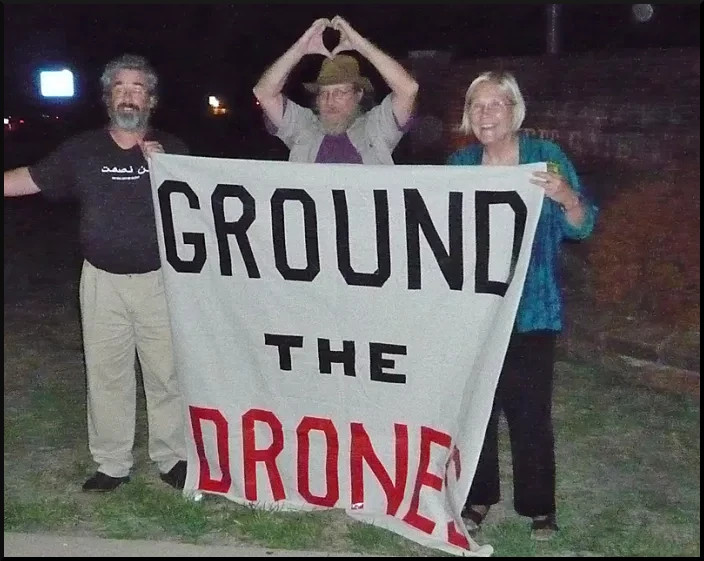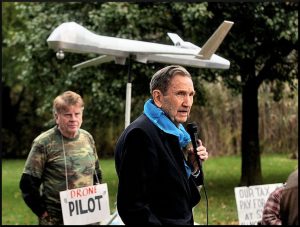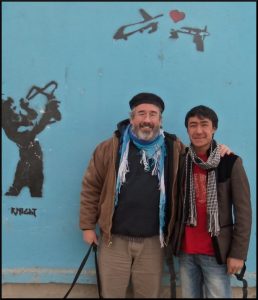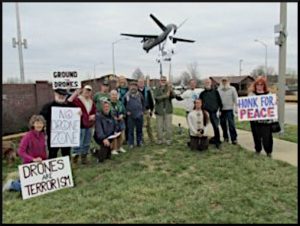Ban Killer Drones: International Campaign of Civil Disobedience Necessary (P2)
by Brian Terrell, published on Covert Action, May 10, 2021
A large campaign of civil disobedience is necessary to abolish one of the U.S. military’s monstrous creations
The headline of the Yankton Daily Press & Dakotan on November 30, 2012, page one above the fold with my photo, read “Terrell: American Drone Strikes Must Stop.”
I was served well by this article explaining my opposition to killing by remotely controlled drones, as that morning I “surrendered” myself to the Federal Prison Camp in Yankton, South Dakota, to begin a six-month prison sentence for protesting at a drone base in Missouri earlier that year.
“While many Americans may think drone strikes are a safe way to conduct war and improve the nation’s safety, one man will go to prison in Yankton today because of his belief that they are remotely committing crimes against humanity,” the paper reported.
That first afternoon, when I walked into the prison’s library, one inmate was reading that article aloud to the others, who broke into applause when they recognized me.
It is a rare event for someone to go to prison for a federal misdemeanor like trespass and, in these days of mass incarceration and maximum-minimum sentencing, it is unusual for anyone to be incarcerated for so short a time as six months except in exchange for testifying against other accused defendants.Having my crime and intention advertised to guards and prisoners alike saved me from the uncomfortable suspicion of being a snitch in prison. It also opened up many great discussions with my fellow inmates over those months.
The sentencing judge in this case had given me six weeks before presenting myself to the prison to put my affairs in order and I used that time traveling through Iowa, Missouri, Illinois, New York and Minnesota, speaking, protesting and organizing with other anti-drone activists.
A reporter from Missouri Public Radio called me during that time and requested an interview. She asked me a question I often hear, if I did not feel that I could do more for the cause by staying out of prison.
I responded by asking her if we would be having this interview if, instead of getting arrested and going to jail for it, I had simply called her station and expressed my concern that the United States was committing war crimes by remote control from Whiteman Air Force Base. This reporter admitted that no, there would not be any interest in talking with me if that were the case.

Terrell (left) protests drones with Colonel Ann Wright (right), at Whiteman Air Force Base in 2012. [Source: flickr.com]
I had irresponsibly squandered any credibility I might have had, he told me. Who will listen to a convict? Within the following six months, my platform from which to speak out about drone warfare expanded to churches, libraries, schools, universities, Quaker meeting houses and community organizations around the U.S., the United Kingdom and Germany, including Yale Divinity School, Harvard Law School and Queen’s College in Birmingham, UK.
This was not the first time I had gone to jail protesting drones. In April 2009, about the time that President Obama made the Predator Drone the key to his “war on terror,” I took part in the first protest of drone warfare anywhere, at Creech Air Force Base in Nevada. Creech was where the drone wars began and where the CIA runs its clandestine program of extrajudicial executions.

Protesters temporarily block traffic outside Creech Air Force Base in Nevada. [Source: commondreams.org]
As a U.S. Air Force veteran of the Cold War, Louie first understood and alerted us to their grim significance. From that beginning, I have been arrested at Creech at least nine times, each time spending anywhere from a few hours to four days in the Clark County Jail in Las Vegas, one of the most squalid and cruel lockups in the country.

Louis Vitale (center), with legendary whistleblower Dan Ellsberg (right), and David Krieger, after arrest in 2012 at Vandenberg Air Force Base. [Source: oaklandvoices.us]
I have also been arrested twice at Wisconsin’s Volk Field, where the National Guard trains soldiers to pilot the Shadow, a surveillance drone that is used for “target acquisition” for armed drones and attack helicopters and, in 2017, I was lodged quite comfortably in the Juneau County Jail for five days after refusing to pay a fine on a trespass charge.
Acts of civil resistance such as these are responses to grave crimes of the state and not crimes in themselves, even when arrest and prosecution seem the immediate outcomes. Such actions are often required, but are not the whole of a campaign for change, either. In resistance to killer drones, such tactics as petitions, billboards, teach-ins, marches, pickets have also been effectively used and more will be needed as we go forward.
Martin Luther King, Jr., explained the necessity of direct action in his 1963 Letter from the Birmingham Jail:“Nonviolent direct action seeks to create such a crisis and establish such creative tension that a community that has consistently refused to negotiate is forced to confront the issue.
It seeks so to dramatize the issue that it can no longer be ignored. I just referred to the creation of tension as a part of the work of the nonviolent resister. This may sound rather shocking. But I must confess that I am not afraid of the word “tension.”
I have earnestly worked and preached against violent tension, but there is a type of constructive nonviolent tension that is necessary for growth.”
Nonviolent direct action is not the whole of a campaign for social betterment, but it is a necessary and indispensable component of any successful one.

The Late Former Attorney General Ramsey Clark addresses a gathering of about 50 defendants and supporters in front of the DeWitt Court House where the 38 Hancock drone protesters were on trial. [Source: mediasyracuse.com]
At the Syracuse trial of the “Hancock 38,” former United States Attorney General Ramsey Clark was permitted to testify on our behalf on the subject of international law.
Judge Gideon, after listening to Mr. Clark speak of the Nuremberg Principles and other laws as they apply to drone warfare at length, leaned over the bench and asked him,
“This is all interesting, but what is the enforcement mechanism? Who is responsible for enforcing international law?”
“They are,” responded Mr. Clark, pointing to the 31 defendants, “and so,” he said to Judge Gideon, “are you!”

Activists Brian Terrell and Ghulam Hussein Ahmadi at the Border Free Center in Kabul, Afghanistan. [Graffiti by Kabul Knight; photo by Hakim]
Voices had also raised drone awareness by organizing several “peace walks” to drone bases, hundreds of miles on foot—from Chicago to a Michigan National Guard base in Kalamazoo; from Madison, Wisconsin, to Volk Field; from Rock Island, Illinois, to the Iowa Air National Guard drone command center in Des Moines—each time meeting with community groups and talking to hundreds of people along the way.

Peace march toward Volk Air National Guard Base in Wisconsin to voice concern with U.S. drone policy. [Source: cnsblog.wordpress.com]
We know many others who, fearing drone violence, have fled their village homes with their families to live in squalid and overcrowded refugee camps.
Activists from Voices in the United Kingdom have been resisting the use of armed drones by the Royal Air Force, including nonviolent resistance at RAF Waddington in Lincolnshire and at factories there producing drones for Israel’s military.
CODEPINK Women for Peace anti-drone activists likewise have traveled to and established friendships in Pakistan, Palestine and other places targeted by weaponized drones.
Banning weaponized drones is not an abstract “cause” but a real human obligation. Addressing resistance to the Vietnam War in 1966, Thomas Merton wrote, “It is the reality of personal relationships that saves everything.” Not every anti-drone activist needs to visit war zones, just as not all of us need to go to prison, but some of us need to do both of these and it is the reality of those personal relationships that keeps our resistance from the abstractions that would otherwise suffocate it.To learn more about the international campaign to ban killer drones, see bankillerdrones.org.
*Featured Image: Brian Terrell (right), with Father Louie Vitale, at a 2009 anti-drone war protest at Creech Air Force Base, outside of Las Vegas, NV. [Source: Jeff Leys]




